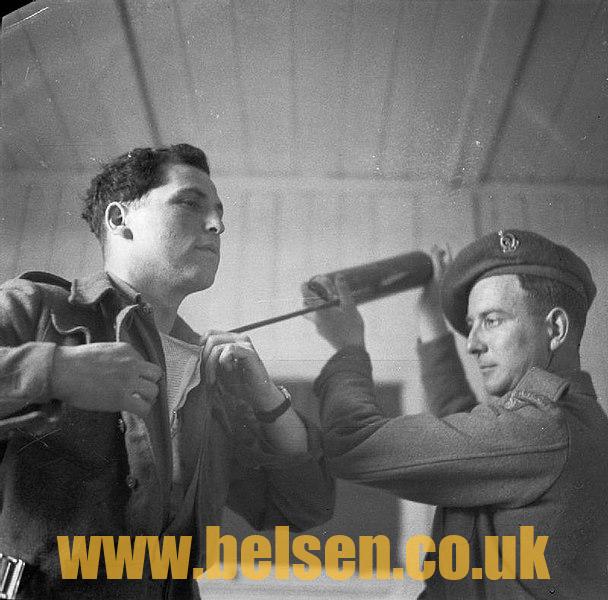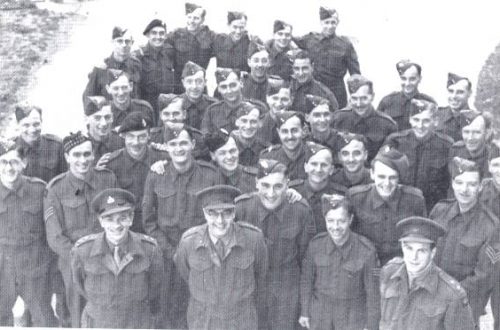Sgt. Mike Lewis (AFPU)
Son of Jewish Polish refugees who had migrated to Britain before WWI, Cameraman Sergeant Mike Lewis was part of the British Army Film and Photographic Unit (AFPU) who filmed the liberation of Bergen-Belsen. He and his wife followed his daughters to Australia in his later years.

The first AFPU team to arrive on April 15 consisted of Sergeants Lewis and Bill Lawrie (film), and Sergeant Harry Oakes and Lieutenant Martin Wilson (stills). They continued coverage until 26 April 1945, when another team took over.
Lewis was profoundly affected by his experience of war as a soldier of the ranks, and having documented the liberation of Bergen-Belsen. He kept an archive of material related to his role in capturing evidence of the “horror camp”.
Lewis recorded his experiences at Bergen-Belsen through testimony as well as creating an album of photographs that he pasted in a scrapbook in a chronological narrative. Still photographs stood in for sequences of film that he took.
“And it became difficult to bury the dead, the thousands of dead. And so a bulldozer was brought in, to bulldoze the dead into a huge pit. And the blade sometimes didn’t catch the bodies cleanly. And they split open. And the smell was terrible.”

“I soaked a handkerchief in petrol and put it over my mouth as I sat in front of the bulldozer. And I couldn’t stand the smell of petrol. And I didn’t know whether to try to bear the smell of petrol, or to take it off and stand the smell of death.”
“I did not speak to them, if one could converse with them because of the language problem. Because what does one say to people who have been through hell? And probably that hell would continue even though they have survived the camp, in their awful memories.”
The film taken by Lewis and Lawrie was used in the Belsen war crimes trial at Lüneburg in September 1945, and was the first use of film as corroboratory evidence. A compilation, supported by affidavits from the cameramen, was screened in the courtroom.
Lewis viewed the rough film shortly after it was cut together and never wished to see it again. Stripped of sound and particularly of smell, the film did not convey the horror of Belsen as he saw it; a memory that never left him.
“There was a stench of human excrement, a stench of death. And the death of all human dignity and hope… the massive scale of death and stench and what had happened to people. I think I was too – perhaps we all were – overwhelmed by feelings to think clearly about it.”
The Lewis archive was donated by his youngest daughter Dr Helen Lewis. Helen discovered images of Bergen-Belsen among her father’s things when she was a young girl. Later in life, reliving the immense impact of that discovery inspired her to research and write about her father’s experiences.
The Dead Still Cry Out: The Story of a Combat Cameraman https://www.textpublishing.com.au/books/the-dead-still-cry-out.
Photos. IWM.
9,014 total views

